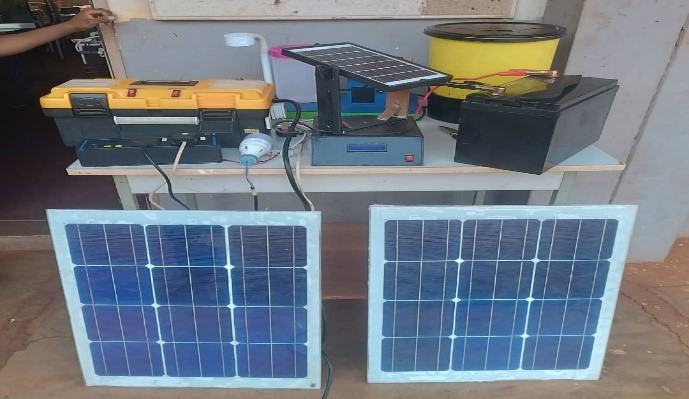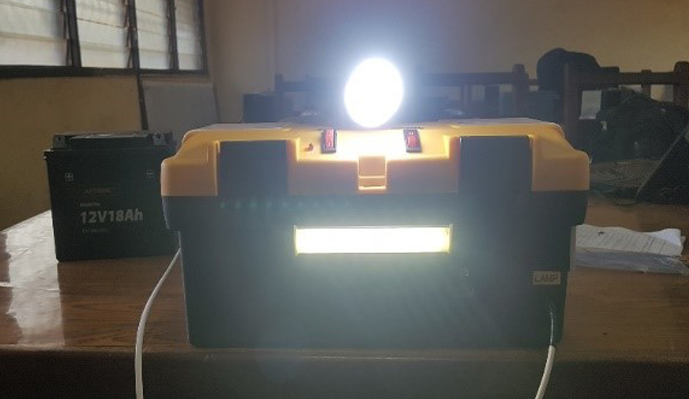
PROJECT
Portable Renewable Power Generation and Management System
TEAM MEMBERS
Simon Atuah Asakipaam
- Department of Electrical/Electronics engineering
- Temale Technical University
- P.O. Box 3 E/R Tamale
- 0247936521
- simonasakipaam@gmail.com
Saibu Padiga Seidu
- Department of Electrical/Electronics engineering
- Temale Technical University
- P.O. Box 3 E/R Tamale
- 0200334387
- padigaseiduyashaibu@gmail.com
Ebenezer Akanqewina
- Department of Electrical/Electronics engineering
- Temale Technical University
- P.O. Box 3 E/R Tamale
- 0249509226
- akanqewina@gmail.com
ABSTRACT
In a bid to address various socio-economic challenges, students from Technical Universities in Ghana proposed a range of cutting-edge solutions. From a Biometric Health Identification System to a solar fruit dryer, and from sustainable paper packaging to a portable renewable power generation system, these innovations aim to transform industries and improve lives. In the healthcare sector, the Biometric Health Identification System and the MedEase app seek to enhance patient identification, data management, and supply chain efficiency. Meanwhile, the PECTA Blood Warmer promises to revolutionize blood transfusion safety. In agriculture, the solar fruit dryer and the improved Plastic Film Mulch Laying Implement aim to reduce post-harvest losses and promote sustainable food production. In energy, the IoT and AI Energy Management System and the portable renewable power generation system seek to optimize energy consumption and reduce reliance on non-renewable sources. Finally, in construction, sustainable flood resilient homes and the use of plastic waste as a binding agent for producing roof and wall tiles offer innovative solutions to environmental challenges.
These pioneering projects have the potential to drive positive change in Ghana and beyond.
1. INTRODUCTION
Ghana’s persistent energy crisis is exacerbated by the rapidly increasing population and corresponding rise in power usage, leading to more frequent power outages. Solar power system presents a promising solution to address this problem. However, the conventional method of setting up solar energy systems in Ghana involves importing bulky solar panels, resulting in higher import duties and logistical challenges. Moreover, these systems are often installed in fixed locations, which limits their flexibility in meeting electricity needs in various settings. For instance, there are numerous situations in Ghana where portable power is critically needed, such as powering police barriers on highways, supporting electoral commission ballot counting processes at night, and enabling students in remote areas to study or prepare for exams. Portable solar power systems can address these needs by providing a flexible and sustainable energy solution. By designing and deploying locally assembled, portable solar generators, Ghana can reduce import costs, engage local labor, and enhance the overall efficiency and accessibility of solar power across various sectors and locations. This approach not only supports the economy but also promotes the widespread adoption of renewable energy, paving the way for a more sustainable future.
2. APPROACH AND UNIQUENESS
To address the challenges above, we imported the solar cells and assembled the solar panels locally to reduce transportation and import duties. We then built a lightweight, easy-to-transport, and cost-efficient portable solar generator for various uses, such as emergencies, camping, outdoor events, and remote locations. The solar generator can power both DC and AC loads and comes with a battery for storage. Additionally, we developed a solar tracking system to adjust the position of the solar panels for maximum harvesting of solar energy/fast charging of the battery and an intelligent power management system for real-time tracking and automated control of power distribution to and usage of the various loads to ensure optimal use of the generated power.

Figure: Testing Process

Final Product for ARC-EDS Exhibition
